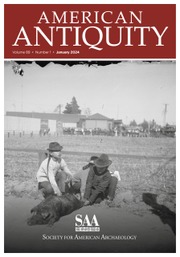Article contents
Archaeological Systematics and the Study of Culture Process1
Published online by Cambridge University Press: 20 January 2017
Abstract
It is argued that the normative theory of culture, widely held among archaeologists, is inadequate for the generation of fruitful explanatory hypotheses of cultural process. One obvious shortcoming of this theoretical position has been the development of archaeological systematics that have obviated any possibility of measuring multivariate phenomena and permit only the measurement of unspecified “cultural differences and similarities,” as if these were univariate phenomena. As an alternative to this approach, it is proposed that culture be viewed as a system composed of subsystems, and it is suggested that differences and similarities between different classes of archaeological remains reflect different subsystems and hence may be expected to vary independently of each other in the normal operation of the system or during change in the system. A general discussion of ceramic classification and the classification of differences and similarities between assemblages is presented as an example of the multivariate approach to the study of cultural variability. It is suggested that a multivariate approach in systematics will encourage the study of cultural variability and its causes and thereby enhance the study of culture process.
- Type
- Research Article
- Information
- Copyright
- Copyright © The Society for American Archaeology 1965
Footnotes
This paper was presented at the 29th Annual Meeting of the Society for American Archaeology, Chapel Hill, North Carolina, 1964.
References
References Cited
- 263
- Cited by


